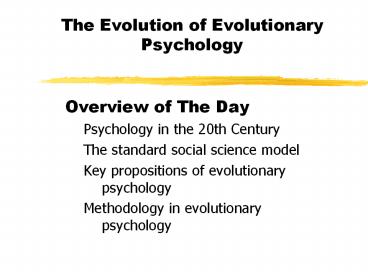The Evolution of Evolutionary Psychology PowerPoint PPT Presentation
1 / 15
Title: The Evolution of Evolutionary Psychology
1
The Evolution of Evolutionary Psychology
- Overview of The Day
- Psychology in the 20th Century
- The standard social science model
- Key propositions of evolutionary psychology
- Methodology in evolutionary psychology
2
PsychologyA Curious
History
- By the early 20th century, evolutionary theory
was firmly established within the discipline of
biology - Darwins theory of evolution and the modern
understanding of genetic inheritance have been
the theoretical underpinnings of biology and the
life sciences since the late 1930s. This has
lead to major advances in evolutionary biology
throughout the twentieth century. - Where was evolutionary theory in psychology?
3
Evolution was almost absent until the 1990s
- A few notable exceptions in the early 20th
century, but they did not catch on - Instinct theories of William James, James
McDougall, and Sigmund Freud - 1920s to 1960s psychology was dominated by
behaviorism - 1970s to 1990s, cognitive revolution in psychology
4
Behaviorism
- Classical and operant
- Pavlov, Thorndike, Watson, Skinner
- Emphases on
- Learning
- equipotentiality principle
- contiguity principle
- Mind as simple learning machine
- Role of the environment in learning
5
The Cognitive Revolution in Psychology
- Focus turned from observable behavior too
workings of the mind - Similar assumptions as behaviorism
- content neutral (equipotentiality)
- domain general mind
- Also, like behaviorism, no real biology
(literature with statistics)
6
Standard Social Science Model (SSSM)
- There is a psychic unity of human nature
- Differences between people arise between
differences in their experiences and cultures - Biological constraints on human behavior are
unimportant - Learning operates by one or a very small number
of general-purpose mechanisms - The job of psychology is to discover how culture
and experience, operating by means of the general
purpose learning mechanisms produce variation in
human behavior
7
Some evolutionary ideas in behaviorism and
cognitive psychology
- Skinner, habitual behaviors, social customs, and
language content--what works through trail and
error - Cognitive psychology. Chomsky
8
Reoccurring Problems with Behaviorism and
Cognitive psychology
- Violations of behaviorist principles
- Misbehavior of animals (animals have specific
natures) - Garcia effect
- Cognitive mental modules, importance of content
(memory for faces vs.. words) - Behavior genetics and role of nature
- Behavioral neuroscience and biology of behavior
9
Enter Evolutionary Psychology
- All species have a nature
- There is a psychic unity of human nature
- People are fundamentally similar. Differences are
superficial - Biological constraints on human behavior are
important - Learning operates by many complex mental modules,
(psychological mechanisms) - The job of psychology is to identify
psychological mechanisms and understand how they
interact with the environment
10
Psychological Mechanisms
- Mental mechanisms that that are adaptations that
evolved during the EEA - Each mechanism tends to have a specific function
- They tend to be problem-specific
- Humans have many mechanisms
- The specificity, complexity, and large numbers of
psychological mechanisms give humans behavioral
flexibility. - Distinct from by-products and random noise
11
Psychological Mechanisms are Not Instincts
- Three problems with using instincts to explain
behavior - 1. Nominal fallacy
- 2. Instinctual explanations avoid environmental
input - 3. No way of telling how many there are
12
Theory In Evolutionary Psychology
- General evolutionary theory
- Middle-level theories
- Specific evolutionary hypotheses
- Specific predictions from evolutionary hypotheses
13
Methods in Evolutionary Psychology
- Comparing different species
- Comparing males and females
- Compare individuals within species
- Compare the same individuals in different
contexts - Experimental methods
14
Sources of Data
- Data from hunter-gatherer societies
- Observations
- Self reports
- Human Products
15
Summary
- Overview of psychologys history and where
evolutionary psychology fits in - The standard social science model
- Key propositions of evolutionary psychology
- Methodology in evolutionary psychology

